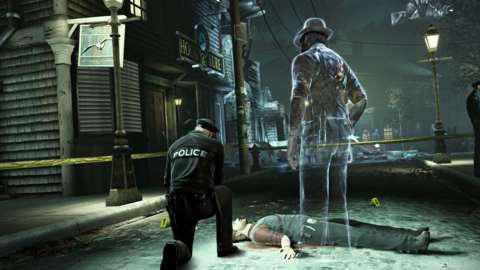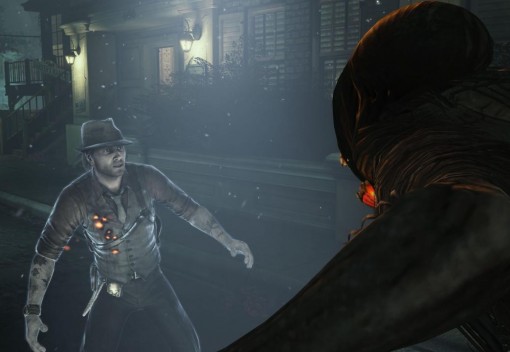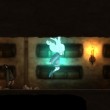Murdered: Soul Suspect Review
There are strange events unfolding in Salem, Massachusetts, and it has nothing to do with the growing ghost population. It's the living who are noticeably off-kilter. As a serial killer slowly picks off the uneasy inhabitants, the frightened few who remain seek shelter in an eerie playground as a foreboding moon illuminates their discontent. Or maybe they embark on a guided tour of the local graveyard, where centuries of restless spirits glide along the foggy paths. To question their puzzling actions during such a stressful period is to understand how dissimilar their decisions are from what you'd expect from a rational being. Murdered: Soul Suspect is full of such abnormalities, and as it struggles to frame its supernatural events in a way that's plausible, you're often overwhelmed with a need to laugh.
However, even though it wears its many faults so openly, Murdered: Soul Suspect manages to demand your attention until the chilling end. This is the rare game that has problems you could count off on your fingers--flaccid visual design, overly dramatic score, underdeveloped characters--but that overcomes its missteps to provide an adventure laced with the empathy of a human-interest story and the constant dread of a well-realized ghost tale. Laugh all you want at Soul Suspect, but it has serious heart as well.
Things get off to a rocky start, not only for the game in question but for its beleaguered protagonist. Ronan is a street-thug-turned-cop whose life story is told through extensive tattoos spread across his body. We see him perish in the opening cutscene, killed by a hooded assailant whose motives, we can deduce, are far from pure. It's then that you embody Ronan's ghost, desperate to solve the mystery of the murder that suddenly ended his life. Such a setup could have provided a solid structure to build upon. However, Ronan's tough-guy act is so painfully generic that there's little more to his characterization than puffing on a ghostly cigarette. He's a stoic blank slate who never made me care who his killer was.
Even though it wears its many faults so openly, Murdered: Soul Suspect manages to demand your attention until the chilling end.
Such a major problem could have derailed this entire adventure, but as Soul Suspect slowly gains its footing, there's more here than a tired protagonist. Ronan's ethereal nature gives him voyeuristic powers that serve to shed light on the people--alive and dead--who still roam the streets of Salem. Much of Soul Suspect involves walking casually through the desolate city. Because you're a ghost, the barriers can't rein Ronan in, so walls are nothing more than opaque passageways. As you examine locales, you discover clues peppered about, filling in details of who you are and where you've come from, along with myriad tidbits about those who inhabit this world with you. And it's piecing together this intricate puzzle that serves as the most interesting aspect of Soul Suspect.
You may come across ghosts who are still stranded in purgatory because they have unfinished business. Clues are strewn about that, once collected and assembled, spell out the causes of their deaths, which have kept them trapped in Salem, and there's inherent pleasure in seeing their troubled stories through to completion. Maybe the boy upset that his drunk driving was the cause of death for his friends and himself can find respite in knowing the truth, or a drowned woman might learn that her death was not in vain. These characters only exist in these small situations, so we don't learn much about who they are. But I felt much closer to the characters when I put their fears to rest, so I welcomed Ronan's knack for investigating.
Other times, you hear only a snatch of information about stranded ghosts, understanding why they haven't moved on to the afterlife without having any chance to save them. There's a college guy who doesn't realize that a fraternity prank went horribly wrong, and a woman suffering deep regret over her own suicide. These views into people's psyches are affecting because it's easy to understand their mindsets even though you spend such little time with them. How trusting that frat-boy pledge was, and how he suffered for what should have been a virtue. And how sad it was to see a woman overwhelmed by her own troubling thoughts, and how desperate she is to reverse her rash decision. These characters felt real in ways I had not expected and pushed me onward to see who else was out there.

If only I didn't need to make so many excuses for the rest of Soul Suspect. There are forced combat encounters against roving demons that make no sense compared to the slow-paced scenes that encompass the rest of the game. Granted, it takes no more than a couple of minutes to get the jump on these prowling reapers, but these scenes still provide only an annoyance that detracts from Soul Suspect's strengths. And then there's a baffling stealth section in which you must help your medium friend sneak through a building that she already has permission to be in. Talk about a forced challenge. Plus, as you're searching for clues in the environments, objects flicker as if they're crossing between two planes, and you can't tell if you've already interacted with them or there's more to do. Much of the action in Soul Suspect feels sloppy, so that you're often fighting to progress instead of helping the story unfold.
At least Soul Suspect's many problems serve as laughable tonal shifts rather than frustrating dead ends. Take, for instance, the rare moments when you must possess a cat. Not only does this look incredibly goofy, but by tapping the otherwise useless meow button, its silly mouth moves like a feline puppet. This is good for comic relief but doesn't exactly fit within the rest of the game. Then there are the contradictory thoughts of the citizens whose minds you can enter. The guy who loves being in a small town but regrets that there's nothing to do is all over the map, and it's sad how many people the developer believes are locked in psychiatric wards because they see bugs crawling up walls. It's a cheap way to exhibit mental problems.

Despite these issues, at no point was I disenchanted by Soul Suspect. Even though I recognized how ludicrous the game often was, I was still invested in the story that was slowly unfolding. Finding the many pieces to hear the troubling truth of a psychiatric ward was well worth the searching it required, so I never got deterred by Soul Suspect's weakness. The strongest story thread belongs to your wife, Julia. She grappled with her feelings for Ronan, struggling to rationalize why she was attracted to a man with so many problems. And she had mental issues of her own, which caused her to question her life choices. Uncovering the details of her life made me care about Soul Sacrifice much more than the flimsy relationship I built with Ronan ever could.
Murdered: Soul Suspect is as troubled as its protagonist. There are so many problems--from the presentation to the story and even technical hiccups--that I was continually pulled out of the experience. And yet, I continued on, and I'm glad that I wasn't overwhelmed by those missteps. It's empowering to piece together the sad details of the people you encounter, and that element was strong enough to keep me engaged throughout. Murdered: Soul Suspect has a lot more spirit than its taciturn protagonist could ever muster.









